Politburo member, President Luong Cuong with delegates at the ceremony to award titles to ambassadors_Source: nhandan.vn
Foreign policy and foreign policy studies
Foreign policy, in the most common sense, is a set of goals and measures that a country implements to ensure and maximize national interests. Foreign policy includes goals and tools determined and used by the State. From another perspective, foreign policy is a part of public policy, therefore, the subject implementing foreign policy is the State. However, with the increasingly close relationship between domestic and foreign affairs, between national and international issues, and the emergence of more and more global issues, the subjects participating and the content of foreign affairs activities are increasingly diverse, clearly demonstrated in the process of planning and implementing foreign policies today.
Another way of understanding foreign policy is that it is a scientific field, because it is planned and implemented on the basis of research results and systematically arranged data. In this process, scientific research plays a role in providing data, serving as a reference for policy makers. For example, in the modern policy making process, data plays a particularly important role. At the Ministry of Foreign Affairs of many countries, this is called the "data-driven policy" approach, which means taking objective scientific data as the basis, instead of relying on the feelings or emotions of the policy maker. Scientific research contributes to increasing reliability and helps to reduce errors in the policy making process. For example, a country's stance on climate change needs to be based on reliable scientific research parameters and results. In this regard, the United Nations Environment Programme (UNEP) has actively called for and participated in many initiatives to promote data-based climate action, typically the #Data4BetterClimateAction campaign. The campaign aims to promote and raise awareness of the value of climate transparency in addressing national development priorities, while implementing international commitments on climate change (1) . It can be seen that countries around the world now recognize the important role of data and objective scientific analysis in effective and transparent policy planning and implementation. This also explains why think-tanks are increasingly playing a prominent role in policy planning and implementation in many countries.
Foreign policy is also an art, because after all, it is the synthesis of many factors, such as national interests, culture, history, political system and decision-making capacity. In particular, the political culture factor plays a particularly important role, deeply affecting the formation of goals, content, ideology, planning process and measures to implement a country's foreign policy (2) . In many cases, for the same problem, policy solutions between countries are not completely the same, due to differences in strategic culture and specific policy traditions of each country. The specificity in foreign policy can only be thoroughly explained through research combining quantitative and qualitative; in many cases, it cannot be completely objectified or universalized.
In the current context of Vietnam, the 13th National Party Congress (January 2021) has set out the requirement to promote the pioneering role of foreign affairs in creating and maintaining a peaceful and stable environment; effectively mobilizing external resources for development; and at the same time, enhancing the country's international position and prestige. At the National Scientific Conference "Vietnam's foreign affairs and diplomacy in the new era, the era of national development" (March 2025), Deputy Prime Minister and Minister of Foreign Affairs Bui Thanh Son cited the direction of General Secretary To Lam on the requirement to objectively, scientifically and most accurately assess the country's advantages and difficulties when entering the new era. From there, correctly identify Vietnam's position and find appropriate solutions to bring the country forward steadily, clearly identifying foreign affairs as an "important and regular" task. Foreign affairs need to be implemented in a synchronous, tight and effective manner on all three pillars: party diplomacy, state diplomacy and people's diplomacy, in order to mobilize the participation of the entire political system, creating a comprehensive national strength in responding to challenges and taking advantage of opportunities in the process of international integration. In other words, foreign policy needs to be understood as a set of systematic, interdisciplinary and inter-sectoral goals and solutions, under the leadership of the Party and the unified management of the State, to ensure and promote national interests in the international arena. Similar to the field of defense and security, Vietnam's foreign policy must ensure synchronicity, comprehensiveness and be the cause of all people, the common task of the entire political system.
Foreign policy studies are closely related to international relations studies, but there are also differences that need to be clarified. First, foreign policy studies tend to focus on the unit level - namely, states - and emphasize the role of individual leaders, apparatuses, agencies and policy makers. Meanwhile, international relations studies tend to analyze subjects and factors at the level of the system, structure and international order, such as studies of the global situation, the comparative correlation of forces or the operation of the international system. Second, a country's foreign policy is often seen as its response to pressures, problems or opportunities arising from the international environment. Therefore, some argue that it is necessary to clearly distinguish between foreign policy studies and international relations studies, because these are two independent academic fields, although both belong to the political science discipline.
However, there is a view that this separation is only relative, because systemic factors are also important inputs in the foreign policy-making process. For example, the foreign policies of many Southeast Asian countries can hardly ignore the strategic competition between major countries and current power centers - one of the most important external factors affecting the policy choices of countries. On the contrary, the policy decisions of countries, especially major countries, also have the ability to shape or change the structure of the international system. In reality, not only major countries but also medium and small countries contribute significantly to shaping the regional and global situation. A study shows that, in responding to non-traditional security challenges, most multilateral cooperation initiatives in pandemic prevention and control are proposed by medium and small countries (3) .
Theories of international relations and foreign policy have an intersection with each other, reflected in the sharing of many concerns and research scopes, when both approach core issues, such as national interests, comparative power relations, international context, as well as policy implementation tools, from politics, economics, defense - security to culture and science - technology. Topics such as human security, climate change or cyber security are increasingly becoming points of convergence in research at both the foreign policy and international relations theory levels, showing the interweaving and complementarity between the two fields. Accordingly, an interdisciplinary approach not only helps deepen theoretical understanding, but also enhances the ability to interpret and make policies in an increasingly complex global context.
Foreign policy research in Vietnam
In Vietnam, foreign policy research is receiving increasing attention and promotion. Speaking at a working session with the Party Committee of the Ministry of Foreign Affairs on the occasion of the 79th anniversary of the establishment of the diplomatic sector (August 29, 2024), General Secretary To Lam emphasized: Diplomacy must rise to new heights, proactively, promptly, pioneer in discovering opportunities and challenges, and increase positive contributions to the successful implementation of the 100-year strategic goals under the leadership of the Party; At the same time, he affirmed that our country is facing a new historical starting point, posing urgent requirements for the diplomatic sector to improve research and forecasting capacity, in order to effectively serve the work of foreign policy planning (4) . In addition, the Document of the 13th National Party Congress clearly stated: "Strengthening research, forecasting, and strategic advice on foreign affairs, avoiding being passive and surprised" (5) . Thereby, it can be seen that the research and advisory work in planning and implementing foreign policies is being given special importance by the Party and State, especially in the context of the increasingly complex and volatile international and regional situation. Currently, many agencies play an important role in this field, typically the Central Theoretical Council, the Ho Chi Minh National Academy of Politics; Communist Magazine, the Vietnam Academy of Social Sciences, research units under the Ministry of Foreign Affairs, the Ministry of National Defense, the Ministry of Public Security, along with many other universities and research institutes inside and outside the political system. This diverse participation not only contributes to deepening the theoretical foundation, but also improves the quality of strategic advisory work in foreign policy planning in accordance with the requirements of the country's development and international integration.
Over the years, foreign policy research in Vietnam has achieved many important achievements, making practical contributions to the cause of national defense and development. President Ho Chi Minh once emphasized: "To be successful, you must know everything in advance", affirming the essential role of forecasting and strategic research. In fact, research and advisory activities have effectively supported the political struggle front in each historical period, especially in the resistance war against American imperialism to save the country. Contributing to the historic victory on April 30, 1975, the diplomatic sector promptly and correctly assessed the international situation, clearly identified partners and targets, thereby supporting the Party Central Committee to make timely and appropriate decisions. During the "fighting and negotiating" period, diplomacy not only went hand in hand with military attacks, but also intensified political attacks, and public opinion forced the US to stop bombing the North, accept a strategic shift, and sit down to negotiate with Vietnam (6) .
Vietnam's foreign affairs achievements in recent times have important contributions from research and policy advice. Quality research is the foundation for building effective policies that are appropriate to the domestic and international context. Many of Vietnam's strategic research agencies have been internationally recognized. According to the 2020 Global Go To Think Tank rankings announced by the University of Pennsylvania (USA), the Institute of World Economics and Politics was ranked 23rd and the Diplomatic Academy ranked 36th in the group of research and policy advice organizations under the global government (7) . Notably, the foreign policy research team in Vietnam not only publishes many domestic publications, but also promotes international publications, increasingly appearing in prestigious journals in the ISI and Scopus systems. This demonstrates the increasingly deep integration of Vietnamese researchers into the global academic community, while contributing to improving the quality of foreign policy planning and implementation in the new context.
In addition to the achievements, research work in Vietnam still has many limitations and challenges. First of all, the investment of resources for research is not commensurate with practical requirements, is still scattered, lacks focus and has not formed strategic spearheads. Facilities and infrastructure serving research are generally still at an average level, not meeting the development requirements in the context of global knowledge competition. The productivity and quality of international publications of the research team are still low compared to the regional and world levels. In particular, the team of leading cadres with the capacity to preside over large-scale, interdisciplinary research tasks of international significance is still lacking (8) , affecting the ability to lead and create breakthroughs in foreign policy research, as well as in social sciences in general. The research capacity and strategic advice of Vietnamese cadres are still limited, there are not many attractive foreign information products, and new media have not been effectively exploited. Vietnam’s current research, situation analysis and strategic forecasting work also face many challenges, largely stemming from the rapidly changing and unpredictable regional and global context. Complex developments, such as geopolitical competition between major countries, shifting balances of power, and the increasingly apparent emergence of non-traditional security challenges, from climate change, pandemics, to cyber security and supply chain crises, are placing increasing demands on the capacity to analyze, forecast and develop policy scenarios.
Many countries in the world devote adequate resources to strategic research, especially in the field of foreign affairs. For example, the Institute for Strategic Studies under the Ministry of Foreign Affairs of China owns up to 160,000 books for research. In terms of budget, the Chinese Academy of Social Sciences (CASS) shows outstanding investment scale. For research projects related to the “Belt and Road Initiative” (BRI) in the period 2013 - 2021, CASS managed a budget of up to 260 million USD. In terms of human resources, CASS has about 4,200 people, of which 3,200 are professional researchers (9) . At the regional level, Singapore clearly prioritizes this field. In 2021, the country decided to increase the budget for social sciences and humanities research to 340 million USD for the 2021 - 2025 period (10) .
Many studies on Vietnam's foreign policy today have not yet achieved optimal quality, especially in terms of methodology and documentation. Many works have not demonstrated breakthroughs in thinking or the ability to apply them in practice. Meanwhile, the foreign policy agenda is increasingly expanding, becoming more interdisciplinary and multidisciplinary, requiring a flexible, integrated and updated research approach. The international context is evolving rapidly, complexly and unpredictably, posing many new challenges to research, forecasting and policy advice. While in the past, foreign policy studies mainly focused on traditional areas such as politics - security and economics, the scope has now been significantly expanded. The process of globalization, the Fourth Industrial Revolution and the rise of non-traditional security challenges are requiring researchers to adjust their approaches and research content to keep up with reality.
With the subjective and objective conditions analyzed, it can be affirmed that the need to improve the quality of foreign policy research is an urgent requirement for Vietnam today. This is also a common trend in many countries in the world, where research is considered an organic part of the entire process of planning and implementing foreign policies. To meet that requirement, it is necessary to create conditions for the team of researchers, scientists and experts in the field of international relations and foreign policy to promote their role and contribute more to the policy-making process. In any field, especially foreign affairs - a field that is both complex and closely linked to the core interests of the country - the role of a team of competent experts is irreplaceable. Listening to and effectively exploiting knowledge from researchers will help foreign policy decisions become more proactive, flexible and closer to the requirements of the situation. Research and advisory agencies in the field of foreign affairs also need to shift from a reactive to a proactive mindset, from responding to challenges to leading with strategic vision. Scientific research, especially forecasting research, needs to be placed at the center of the policy-making process, in order to better prepare for the next stages, in the context of an uncertain international environment and increasing strategic competition.
Politburo member and Prime Minister Pham Minh Chinh attended the opening session of the 3rd United Nations Ocean Conference (UNOC 3) in France_Photo: VNA
To contribute to improving the quality of research on Vietnam's foreign policy
Based on the foreign policy of the 13th National Party Congress, Resolution No. 59-NQ/TW, dated January 24, 2025, of the Politburo, "On international integration in the new situation" and Resolution No. 57-NQ/TW, dated December 22, 2024, of the Politburo, "On breakthroughs in science, technology, innovation and national digital transformation", together with the above approaches and analyses, in order to contribute to improving the effectiveness of research work serving the implementation of the foreign policy of the Party and State, while ensuring and maximizing national interests in the new era, it is necessary to implement a number of specific solutions as follows:
Firstly , in terms of research topics, in addition to traditional topics such as national foreign policy, bilateral and multilateral relations, it is necessary to promote in-depth research on specific aspects and new issues to address practical policy challenges in the context of rapidly changing international situations. Enhance access to current prominent topics, such as the role of artificial intelligence (AI) in foreign policy planning and implementation; issues related to the Fourth Industrial Revolution and foreign affairs, such as cross-border data flows, protecting national sovereignty in cyberspace, as well as multilateral digital connectivity models. Speaking at the National Conference to disseminate and implement the "Quad Pillars" (11) of the Politburo's resolution (May 18, 2025), General Secretary To Lam emphasized: "Perfecting institutions, proactively removing legal and administrative barriers, creating a favorable environment for innovation, research and application of science and technology, turning institutions into national competitive advantages" (12) .
Second , in terms of research approaches and methods, we need to further promote systematic, interdisciplinary and multidisciplinary research. The nature of foreign policy research is research on strategic issues, closely linked to the vital interests of people, businesses and localities. Therefore, ensuring comprehensiveness in identifying, assessing problems and proposing solutions is extremely necessary. Research also needs to reflect the multi-dimensional viewpoints and voices of subjects and objects affected by the policy, while requiring closer coordination and connectivity between agencies and research institutes.
Third , in terms of research resources, more attention should be paid to the role of objective scientific data. For example, Vietnam's decisions on climate change need to be based on reliable scientific research and data. In many cases, foreign policy research needs to access large, reputable databases such as those of the World Bank (WB), the International Monetary Fund (IMF), the United Nations Educational, Scientific and Cultural Organization (UNESCO), specialized agencies of the United Nations, as well as academic data platforms such as ProQuest, JSTOR and AI tools. In this direction, it is necessary to increase the application of quantitative research methods, especially in assessing the effectiveness and impact of policies.
Fourth , in terms of research organization, continue to strengthen close coordination between research and policy advisory agencies of ministries, sectors, organizations and localities to promote the comparative advantages of each unit, while avoiding duplication in research topics and subjects. Science management agencies such as the Ministry of Science and Technology need to promote a stronger coordinating and regulating role in research activities to ensure quality and efficiency. International cooperation in foreign policy research is also a necessary direction, depending on each specific field, issue and partner, and at the same time need to aim towards compliance with higher international standards, such as publishing scientific works according to ISI/Scopus standards.
Fifth , in terms of resources, continue to focus on improving the capacity of research agencies, especially the team of staff doing research work. Increasing investment in facilities, working conditions and remuneration for research staff is extremely necessary. At the same time, improve and enhance the efficiency of using budget resources for foreign policy research. As mentioned, current investment in research work still does not meet practical requirements and is quite modest. Therefore, a well-prepared and effectively used resource is a solid foundation for the sustainable development of research work.
Scientific research, including foreign policy research in Vietnam, has achieved many positive results in recent years. Foreign affairs achievements since the beginning of the 13th Party Congress have all had important contributions from research results and advice from agencies in the foreign affairs field, from situation assessment and forecasting to policy planning and implementation. Along with the increasingly deep international integration process, foreign policy research in Vietnam has expanded in content, program scope and become more diverse in terms of participants, under the leadership of the Party, unified management of the State and active coordination of research and policy-making agencies.
Faced with the increasing demands for objectivity and subjectivity, foreign policy research in Vietnam needs to continue to be improved appropriately. First of all, it is necessary to affirm that research is a mandatory step and plays a fundamental role in the process of policy planning and implementation. All policies need to be based on systematic, systematic scientific research and have objective criticism. Close and interconnected cooperation between research and advisory agencies is an urgent requirement in the context of foreign affairs issues becoming increasingly interdisciplinary and multi-disciplinary. Foreign policy research needs to be approached at the government-wide, even system-wide level. The ability to effectively coordinate between the subjects participating in policy planning and implementation determines the quality and timeliness of policy responses. At the same time, investment in improving the capacity of research staff and allocating resources appropriately needs to have a fundamental change to meet the requirements of building a comprehensive and modern diplomacy in the new era, contributing to ensuring the highest national interests, especially in the period from now to 2030, with a vision to 2045./.
------------------------
* The article is the result of the research of the scientific topic "Summary, evaluation, lessons learned from Vietnam's diplomatic experience after 40 years of renovation and policy recommendations for Vietnam from now to 2030" under the "Research program Summarizing the history of Vietnam's diplomacy for 40 years (1986 - 2026)".
(1) “Data for better climate action”, UN Environment Programme, 2021, https://unepdtu.org/data-for-better-climate-action/
(2) Rujing Ye - IA Khan: “A Comparison of Foreign Policies between China and the US Based on Political Culture Theories”, SHS Web of Conferences, Vol. 187, No. 5, March 20, 2024
(3) Hillary Briffa: “Small States and COVID-19: Challenges and Opportunities for Multilateralism,” Global Perspectives, Vol. 4, No. 1, 2023, https://online.ucpress.edu/gp/article/4/1/57708/195113/Small-States-and-COVID-19-Challenges-and
(4) See: “General Secretary and President To Lam: Vietnamese diplomacy must rise to be worthy of being the “vanguard”, the combined arms of the Vietnamese revolution”, Vietnam News Agency, August 29, 2025, https://nvsk.vnanet.vn/tong-bi-thu-chu-tich-nuoc-to-lam-ngoai-giao-viet-nam-phai-vuon-len-xung-dang-la-doi-quan-tien-phong-binh-chung-hop-thanh-cua-cach-mang-viet-nam-8-151308.vna
(5) Documents of the 13th National Congress of Delegates, National Political Publishing House Truth, Hanoi, 2021, vol. I, p. 165
(6) Bui Thanh Son: “Vietnamese diplomacy contributes to the liberation of the South and national reunification - Historical lessons that remain valuable”, Government Electronic Newspaper, April 30, 2025, https://baochinhphu.vn/ngoai-giao-viet-nam-dong-gop-vao-giai-phong-mien-nam-thong-nhat-dat-nuoc-nhung-bai-hoc-lich-su-con-nguyen-gia-tri-102250429175746744.htm
(7) James G McGann: “2020 Global Go To Think Tank Index Report”, Think Tanks and Civil Societies Program (TTCSP), University of Pennsylvania, January 28, 2021, https://www.bruegel.org/sites/default/files/wp-content/uploads/2021/03/2020-Global-Go-To-Think-Tank-Index-Report-Bruegel.pdf
(8) Huynh Thanh Dat: “Increasing investment at the right level for basic research - A fundamental factor to create breakthroughs in science, technology and innovation for the sustainable development of the country”, Electronic Communist Magazine, September 25, 2022, https://www.tapchicongsan.org.vn/media-story/-/asset_publisher/V8hhp4dK31Gf/content/tang-cuong-dau-tu-dung-tam-cho-nghien-cuu-co-ban-nhan-to-nen-tang-tao-dot-pha-phat-trien-khoa-hoc-cong-nghe-va-doi-moi-sang-tao-vi-su-phat-trien-ben-v
(9) See: “University of Chinese Academy of Social Sciences (Beijing)”, Concurrences , 2025, https://awards.concurrences.com/en/authors/university-of-chinese-academy-of-social-sciences
(10) Cheryl Tan: “MOE to raise spending to $457m over next five years to boost social science and humanities research”, The Straitstimes, September 21, 2021, https://www.straitstimes.com/singapore/moe-to-raise-spending-to-457m-over-next-five-years-to-boost-social-science-and-humanities
(11) Four Resolutions of the Politburo, including: Resolution No. 57-NQ/TW, dated December 22, 2024, “On science and technology, innovation and national digital transformation”; Resolution No. 59-NQ/TW, dated January 24, 2025, “On international integration in the new situation”; Resolution No. 66-NQ/TW, dated April 30, 2025, “On innovation in law-making and enforcement to meet the requirements of national development in the new era” and Resolution No. 68-NQ/TW, dated May 4, 2025, “On private economic development”
(12) To Lam: “Full text of General Secretary To Lam's speech at the conference to implement Resolution 66 and Resolution 68”, Government Electronic Newspaper, May 21, 2025, https://xaydungchinhsach.chinhphu.vn/toan-van-phat-bieu-cua-tong-bi-thu-to-lam-tai-hoi-nghi-trien-khai-nghi-quyet-66-va-nghi-quyet-68-119250518131926033.htm
Source: https://tapchicongsan.org.vn/web/guest/quoc-phong-an-ninh-oi-ngoai1/-/2018/1098802/tang-cuong-cong-tac-nghien-cuu%2C-gop-phan-nang-cao-hieu-qua-hoach-dinh-va-trien-khai-chinh-sach-doi-ngoai-cua-viet-nam-trong-ky-nguyen-moi.aspx



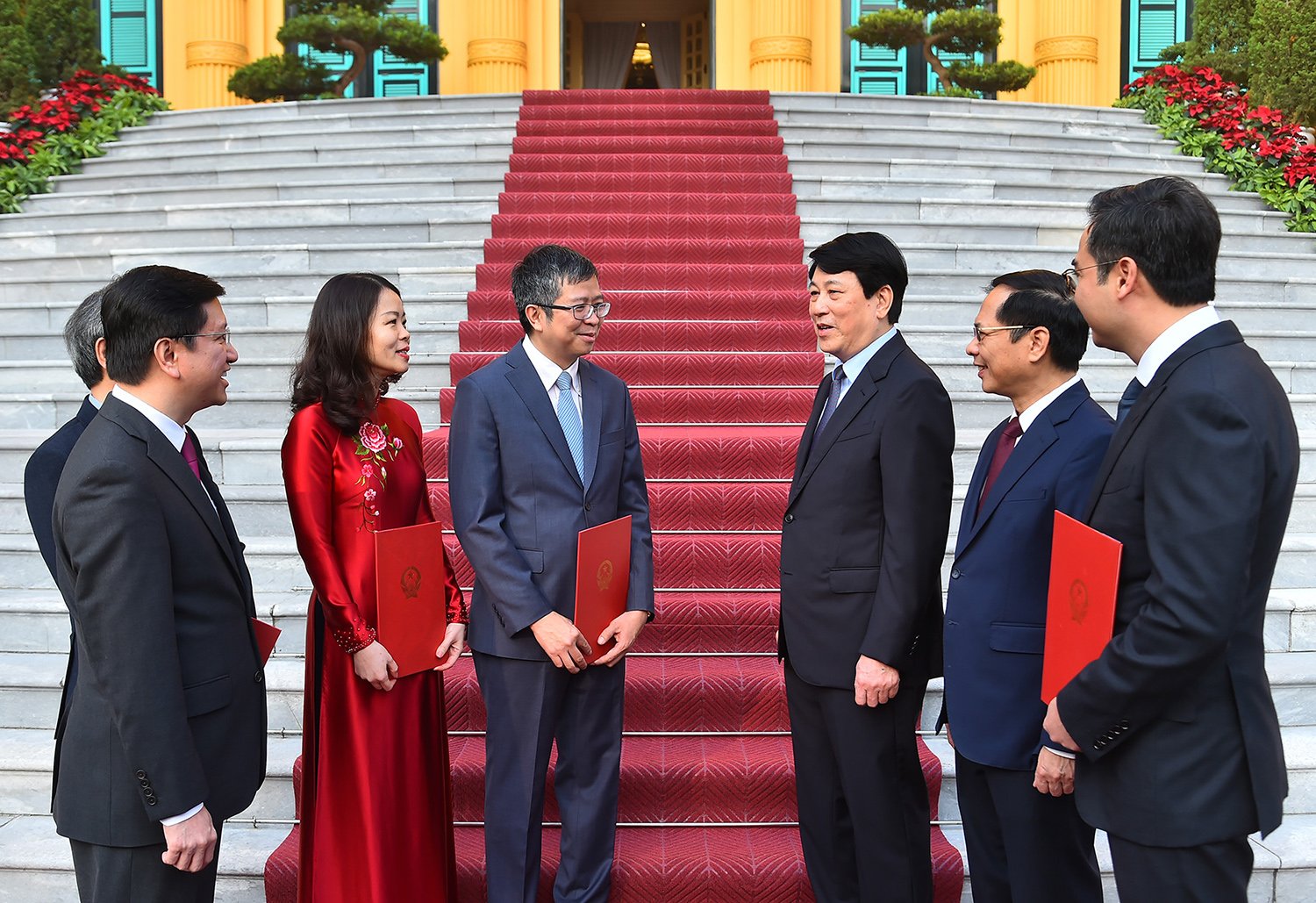
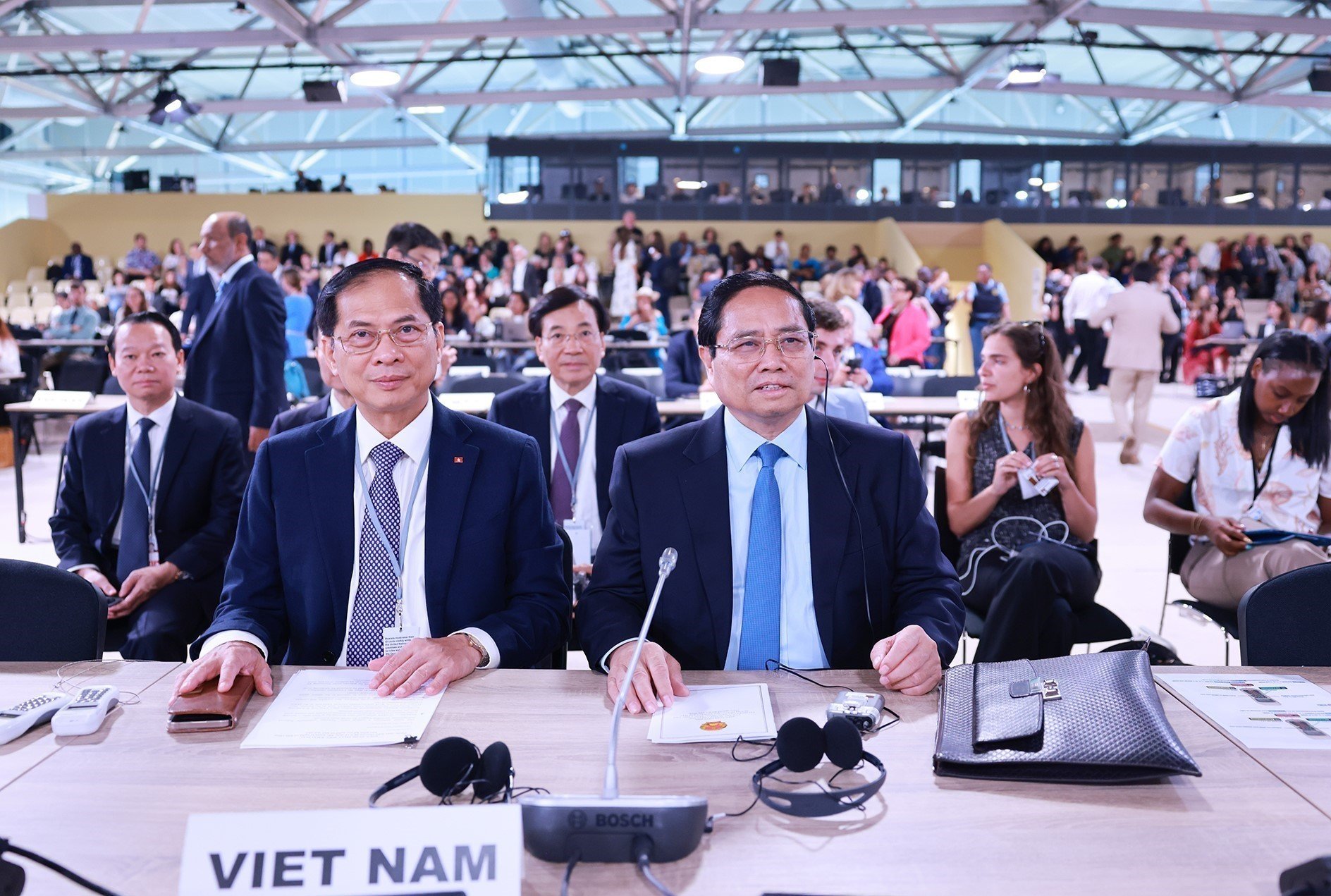
![[Photo] Politburo works with the Standing Committee of Cao Bang Provincial Party Committee and Hue City Party Committee](https://vphoto.vietnam.vn/thumb/1200x675/vietnam/resource/IMAGE/2025/8/28/fee8a847b1ff45188749eb0299c512b2)
![[Photo] National Assembly Chairman Tran Thanh Man holds talks with New Zealand Parliament Chairman](https://vphoto.vietnam.vn/thumb/1200x675/vietnam/resource/IMAGE/2025/8/28/c90fcbe09a1d4a028b7623ae366b741d)
![[Photo] General Secretary To Lam presents the 45-year Party membership badge to comrade Phan Dinh Trac](https://vphoto.vietnam.vn/thumb/1200x675/vietnam/resource/IMAGE/2025/8/28/e2f08c400e504e38ac694bc6142ac331)

![[Photo] General Secretary To Lam attends the opening ceremony of the National Achievements Exhibition](https://vphoto.vietnam.vn/thumb/1200x675/vietnam/resource/IMAGE/2025/8/28/d371751d37634474bb3d91c6f701be7f)
![[Photo] Red flag with yellow star flutters in France on National Day September 2](https://vphoto.vietnam.vn/thumb/1200x675/vietnam/resource/IMAGE/2025/8/28/f6fc12215220488bb859230b86b9cc12)
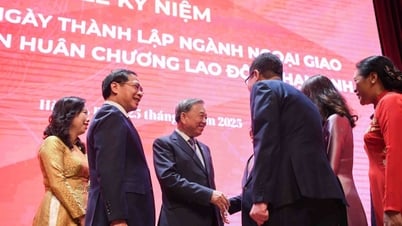


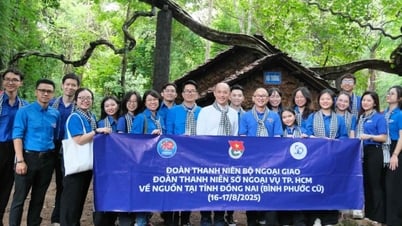
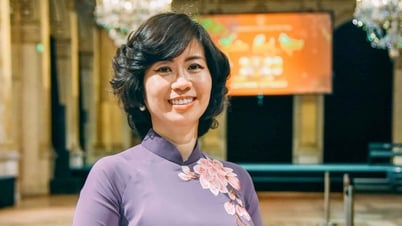


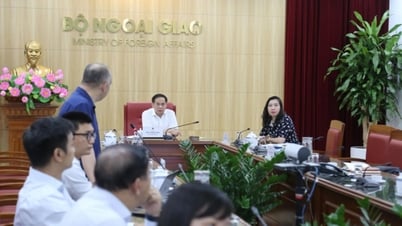










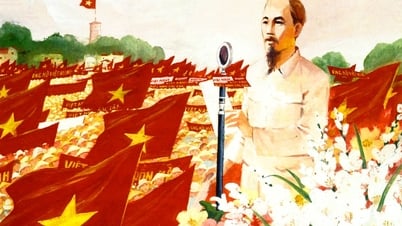
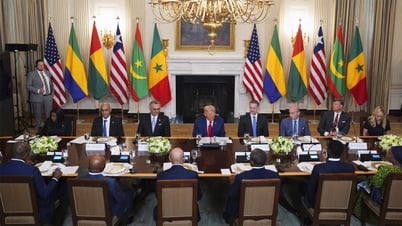
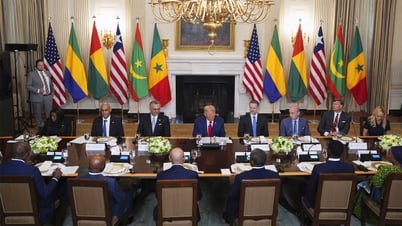























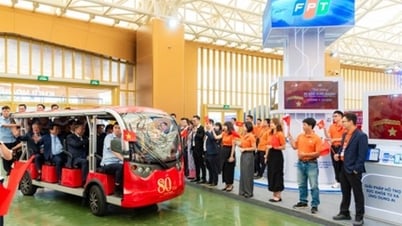














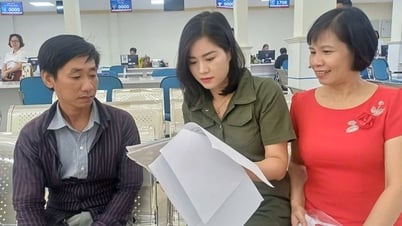

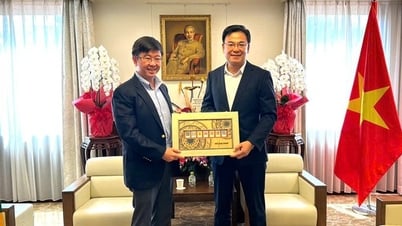
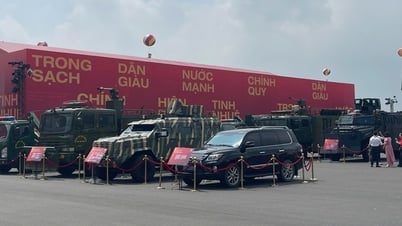











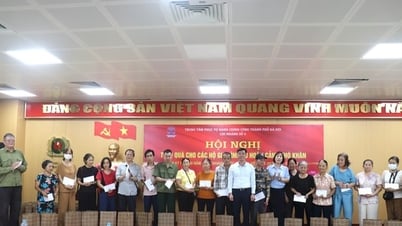
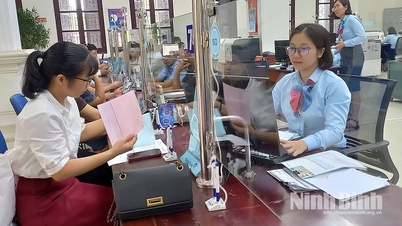
















Comment (0)